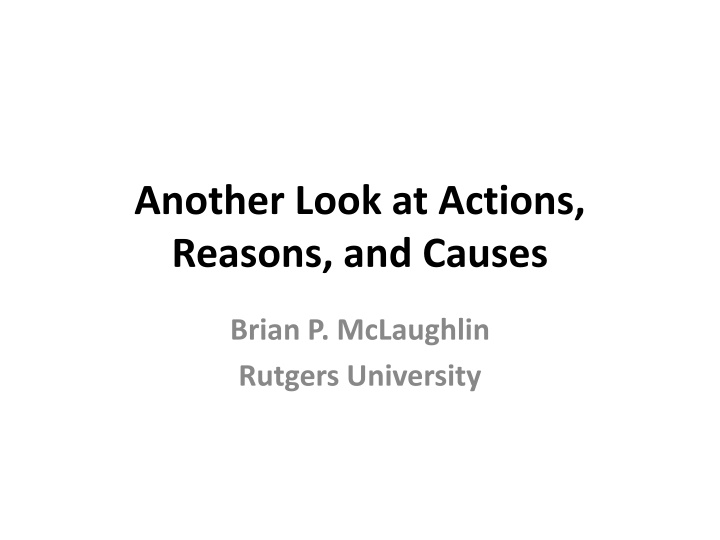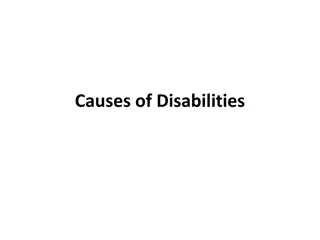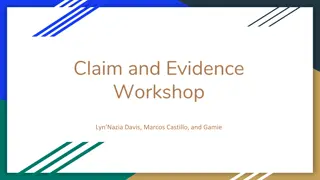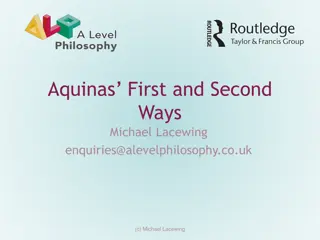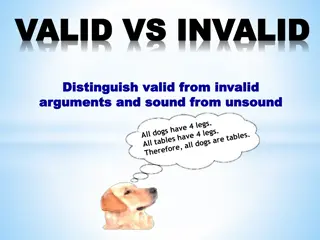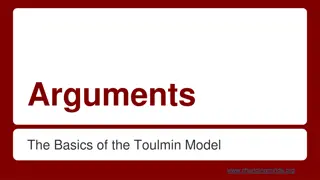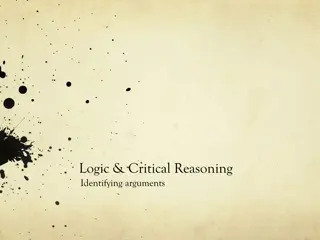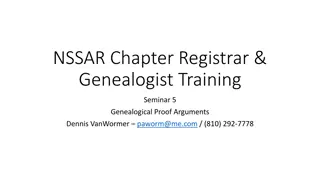Revisiting Davidson's Arguments on Actions, Reasons, and Causes
Over sixty years after the publication of Donald Davidson's seminal paper on Actions, Reasons, and Causes, there is ongoing debate about whether rationalization is a form of causal explanation. This article challenges Davidson's viewpoint and discusses the relation between reasons and actions, exploring the role of primary reasons as causes of actions.
Download Presentation

Please find below an Image/Link to download the presentation.
The content on the website is provided AS IS for your information and personal use only. It may not be sold, licensed, or shared on other websites without obtaining consent from the author.If you encounter any issues during the download, it is possible that the publisher has removed the file from their server.
You are allowed to download the files provided on this website for personal or commercial use, subject to the condition that they are used lawfully. All files are the property of their respective owners.
The content on the website is provided AS IS for your information and personal use only. It may not be sold, licensed, or shared on other websites without obtaining consent from the author.
E N D
Presentation Transcript
Another Look at Actions, Reasons, and Causes Brian P. McLaughlin Rutgers University
It has been over sixty years since the publication of Donald Davidson s Actions, Reasons, and Causes (ARC). It's an understatement to call the paper seminal. It s one of the most influential philosophy papers of the Twentieth Century.
It famously stemmed a tide of Wittgenstein-inspired books that defended the view that action explanations are not causal explanations. There is, to be sure, much that it has taught us. But the books in question had lessons to teach us too, some of which have been largely forgotten.
Although ARC is one the papers I most admire, I don t think that it succeeds in its main stated aim. The paper opens with the following passage:
What is the relation between a reason and an action when the reason explains the action by giving the agent s reason for doing what he did? We may call such explanations rationalizations, and say that the reason rationalizes the action. In this paper I want to defend the ancient and commonsense position that rationalization is a species of causal explanation.
Davidson did not, I believe, succeed in showing that rationalization is a species of causal explanation. More importantly, it isn t a species of causal explanation. Or so I ll argue in due course.
A key part of Davidsons defense of the claim that rationalization is a species of causal explanation is that what he calls primary reasons (complex mental states consisting of a pro-attitude toward bringing about a certain end and an instrumental belief about how one will or could or might achieve that end) are causes of the actions they explain.
Heres his argument for that claim: In order to turn the first `and to `because in `He exercised and he wanted to reduce and thought exercise would do it , we must, as the basic move [maintain that] a primary reason for an action is its cause. (ARC) I think that we needn t make `the basic move in order to turn the first `and to `because . That is, we needn t maintain that beliefs and desires cause actions in order to maintain that he exercised because he wanted to reduce and thought exercise would do it.
As will become apparent in due course, my reason for thinking that is in the vicinity of a reason offered in some of the literature to which Davidson was responding.
I wont, however, argue that rationalization isn t a species of causal explanation on the grounds that primary reasons aren t causes. Moreover, I think that explanations of actions in terms of primary reasons are causal explanations.
I think `He exercised because he wanted to reduce and believed exercise would do it is a causal explanation of his exercising. But, as we ll see later, that doesn t require his want and belief to be causes of his exercising. Moreover, there is a case to be made that they aren t causing of his exercising, even when they causally explain it.
Ill offer a conditional defense of the claim that pro-attitudes and beliefs are not causes of the actions they explain. I ll argue that if a certain view of propositional attitudes is correct, a view that enjoys fairly wide acceptance and that I myself find attractive (but won t argue for), then pro-attitudes and beliefs do not cause the actions they explain.
Still, explanations of actions in terms of primary reasons (beliefs and pro-attitudes) are causal explanations. But it doesn t follow from that that rationalization is a species of causal explanation. And my main aim is to argue that it isn t a species of causal explanation.
The reasons Ill offer in support of that claim, my main claim, will also be in the vicinity of reasons offered in some of the literature to which Davidson is responding. They don t rely on any assumptions about the nature of beliefs and desires or the nature of causation.
My case that rationalization isnt a species of causal explanation will be entirely independent of my (conditional) case that primary reasons aren t causes.
Even if primary reasons cause the actions they explain, it is nevertheless the case that rationalization isn t a species of causal explanation. Either of my arguments can succeed and the other fail.
Ill first outline a case that primary reasons aren t causes of the actions they causally explain. Then, I ll argue at length for my main thesis, namely that rationalization isn t a species of causal explanation.
Davidson defends the claim that a primary reason for an action is its cause (ARC, 12) against several lines of attack, one of which is this: a cause must be logically distinct from the alleged effect, but a reason for an action is not logically distinct from the action; therefore reasons are not causes of actions. (ARC)
This is the infamous logical connection argument. Davidson is widely credited with having conclusively refuted it in the following passage:
Surely notevery true causal statement is empirical. For suppose `A caused B is true. Then the cause of B = A; so substituting, we have `The cause of B caused B , which is analytic. The truth of a causal statement depends on what events are described; its status as analytic depends on how the events are described. (Italics his)
`The cause of B caused B, however, is not analytic. It implies that B occurred, and it implies that B had a unique cause. Similarly, `My mosquito bite was caused by a mosquito isn t analytic. It implies that I have been bitten, that I have a mosquito bite, that there are mosquitos, and no end of other contingent claims.
The following statement is analytic: If there is a unique cause of B, then the cause of B caused B. But that statement is not a causal statement since it doesn t assert a causal relation.
Still, if the idea behind the logical connection argument were that because-statements linking primary reasons and actions are analytic, the argument would obviously fail. `He exercised because he desired to reduce and believed that by exercising he would reduce is certainly not analytic. Moreover, Davidson is certainly right when he says: Because `I wanted to turn on the light and `I turned on the light are logically independent, the first can be used to give a reason why the second is true.
But if that was not the idea behind the argument, then what was the idea behind the argument? First of all, there was no single idea. The logical connection argument is actually not a single argument, but rather a family of arguments. One of the leading versions appealed to the idea that beliefs and desires are dispositions. I ll be concerned with that version of the logical connection argument.
At the risk of oversimplifying the history, proponents of this version of the argument presupposed the phenomenal theory of dispositions, the theory that dispositional terms can be defined in terms of counterfactuals. According to that theory, O is fragile if and only if O would break if were it struck.
Its easy to see why, on that view, fragility wouldn t count as a cause of something s breaking. Something s being fragile just is its being such that it would break were it struck. Something s being such that it would break were it struck doesn t cause it to break when struck.
The phenomenal theory of dispositions is now widely rejected. It is fairly widely held that dispositional terms cannot be so defined, that although counterfactuals can perhaps state defeasible criteria for dispositional states, dispositional states cannot be analyzed in terms of counterfactuals.
A criterial counterfactual for a disposition can be false due to preemption, while the object has the disposition. Also, it is possible for such a counterfactual to be true of an object, but for some reason other than the fact that the object has the disposition in question.
It is now fairly widely held that dispositions must have categorical bases. The bases of garden variety dispositions such as fragility, water- solubility, water-absorbency, ductability, and the like, are microstructural states. Such states are causes.
On the role-functionalist theory of dispositions, dispositions are functional states: states of being in some state or other that has a certain causal role, a role as cause or effect, or both. The first-order states that have the causal roles are bases for the dispositions.
Water solubility, for instance, is the state of being in some state or other that disposes objects in it to dissolve when immersed in water; fragility is the state of being in some state or other that disposes objects in it to shatter when struck; ductability is the state of being in some state or other that disposes objects in it to change shape under pressure.
Being immersed in water is the activation condition for the disposition of water solubility; dissolving in water is the manifestation of the disposition; and the state has multiple bases, one of which is being composed of sodium chloride. Of course, a disposition can be very complex, can be multi-tracked, having many activation conditions and many manifestations, conditional on various other conditions holding.
The causal role is typically a conditional role as cause and a conditional role as effect. The types of first-order states that occupy the causal role in question realize the disposition. Realization in this sense (there are other notions in the literature) is the relation of role occupancy.
Thus, on the role-functionalist theory of dispositions, the bases of dispositions are realizers of it. A type of disposition can have more than one basis. If it does, it is multiply realizable.
A basis of a disposition causes (or tends to cause) a manifestation of it in an activation condition for the disposition, provided that suitable standing conditions obtain. But dispositions themselves do not cause their manifestations. Their bases do. It is the substance s being composed of sodium chloride that disposes it to dissolve when immersed in water, not its being water- soluble.
The second-order state of being in some state or other that disposes it to dissolve when immersed in water doesn t cause it to dissolve. The first-order realizing state does. More generally, a state such as being in some state or other that causes a certain effect E doesn t itself cause E. There isn t double-occupancy of the causal role, occupancy by both the realizer and the role-functional state.
Dispositions dont cause their manifestations. And if they don t cause their manifestations, then they don t cause anything by causing their manifestations. If water solubility doesn t cause dissolving, then it doesn t cause anything by causing dissolving. Indeed, arguably, on the role-functionalist view, dispositions don t cause anything, only their bases, their realizers do.
That doesnt make dispositions or role- functional states irrelevant to causal matters. Given that dispositions have bases that they are role-functional states with realizers we can see how dispositions can figure in causal explanations of their manifestations, even if they are not themselves causes of them.
Frank Jackson maintains that dispositions don t cause their manifestations, but acknowledges that Richard Feynman nonetheless succeeded in explaining the Challenger disaster in terms of the elasticity at low temperature of the O-ring. He notes:
When we explain by citing a dispositional property, we make two claims together. First, we say that what was caused was caused by the disposition s categorical basis Second, we say that the kind of inputs and outputs distinctive of the disposition in question lie in the causal path of what happened One part of what Feynman was saying was that the categorical basis of the loss of plasticity caused the disaster, the other part, the more interesting part, was that what happened resulted from the kind of output distinctive of the loss of elasticity: the O-ring failed to expand after pressure, and its failure to do so led to the disaster.
Role-functionalism is one of the leading theories of mental states such as pro-attitudes and beliefs. It is the view that such mental states are role-functional states that, on the evidence, are multiply realizable by physical states.
On this role-functionalist view, beliefs and desires are second-order states: states of being in some first- order state or other that has a certain complex causal role, that is, a first-order state that has a vast range of conditional backward- looking and conditional forward- looking causal features.
Actions are among the manifestations of beliefs and desires. They are among the effects that the realizers of the beliefs and desires would have conditional on many other conditions (mental and physical) obtaining. On the role-functionalist view, the actions aren t caused by the beliefs and desires themselves, but rather by their realizers. There is no double-occupancy of the causal roles.
On the role-functionalist view, an agent s desire to reduce and belief that he can do so by exercising aren t causes of his exercising; rather, his exercising is a conditional manifestation of that desire and belief. That manifestation is caused by realizers of the belief and desire, not by the belief and desire.
Still, though, beliefs and desires can causally explain. This role-functionalist theory is perfectly compatible with the claim that `He exercised because he wanted to reduce and believed he could do so by exercising is a causal explanation. We now see how that could be so, even if beliefs and desires don t cause the actions they explain.
Davidson himself took beliefs and pro- attitudes to be dispositions. As concerns the thesis that a primary reason for an action is its cause, he says: The first line of attack is this. Primary reasons consist of attitudes and beliefs, which states or dispositions, not events, therefore they cannot be causes. Davidson, you ll recall, champions the view that causes and effects are events.
Davidson responds to this line of attack by pointing out that dispositions are frequently cited as causal factors or conditions in causal explanations, saying at one point that one can causally explain dissolving by pointing out that the object in question is water- soluble, and adds that there is a deeper causal explanation in terms of a structural state.
He also says that although dispositions are not events, the acquisition of a disposition is an event. That point, however, doesn t seem especially relevant. We typically explain actions by appeal to current beliefs and pro-attitudes, rather than by appeal to the events of acquiring the beliefs or pro-attitudes. The beliefs and pro-attitudes we cite can be long standing, and acquired at very different times.
The point to underscore for present purposes is that Davidson himself, even in ARC, does not actually think that beliefs and pro- attitude cause actions. When he is being careful, he calls them causal conditions, rather than causes. This is in fact a view he held throughout his career. Given his own views, it is thus inaccurate to claim that primary reasons cause actions.
Although I lack the time for a proper historical discussion, I want to note that, arguably, the grain of truth in the version of the logical connection argument in question is that beliefs and desires are dispositions, that actions manifest them, and that dispositions don t cause their manifestations. Proponents of this version were right that dispositions aren t causes, but they were wrong in thinking that dispositions don t causally explain.
